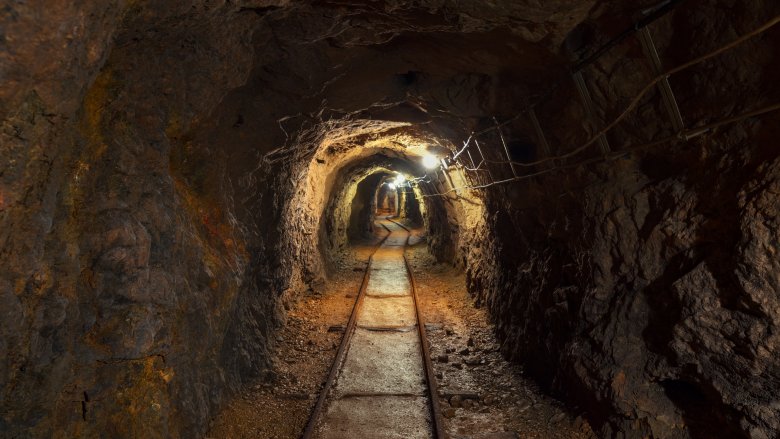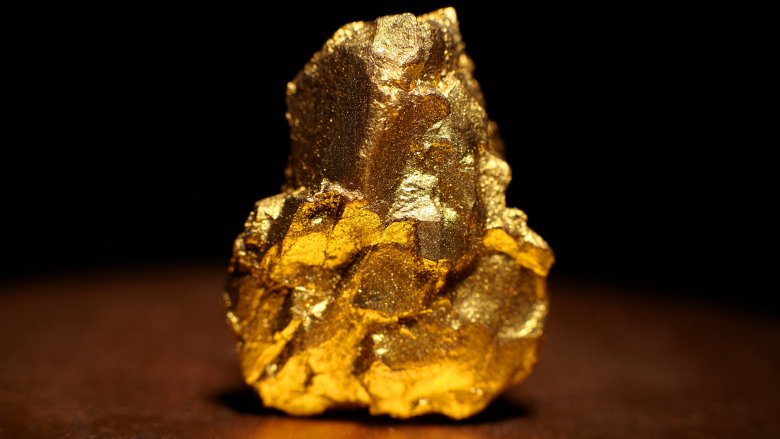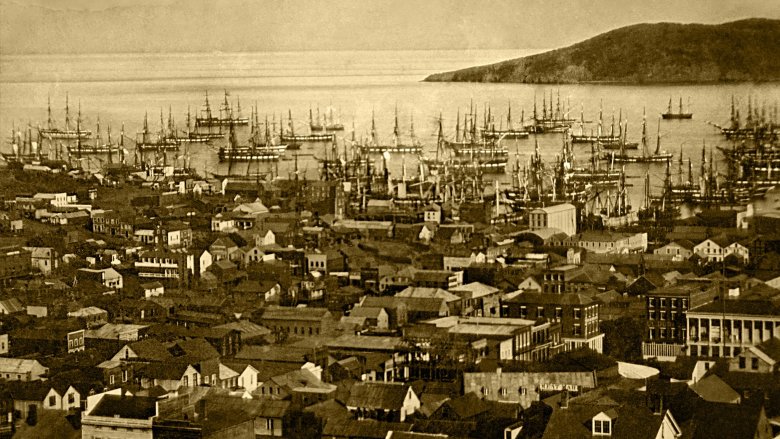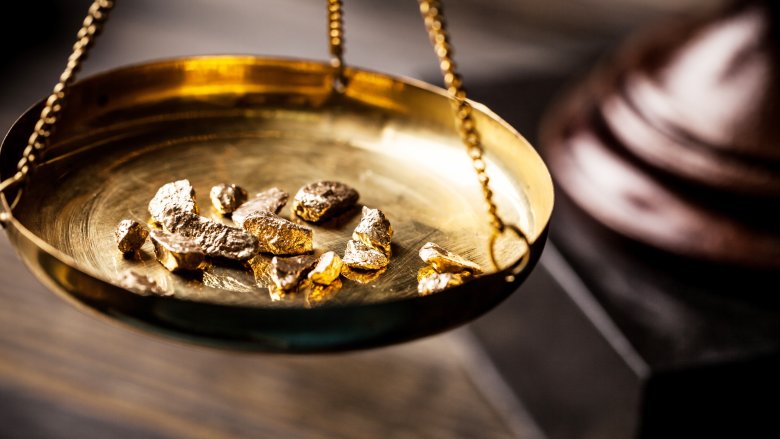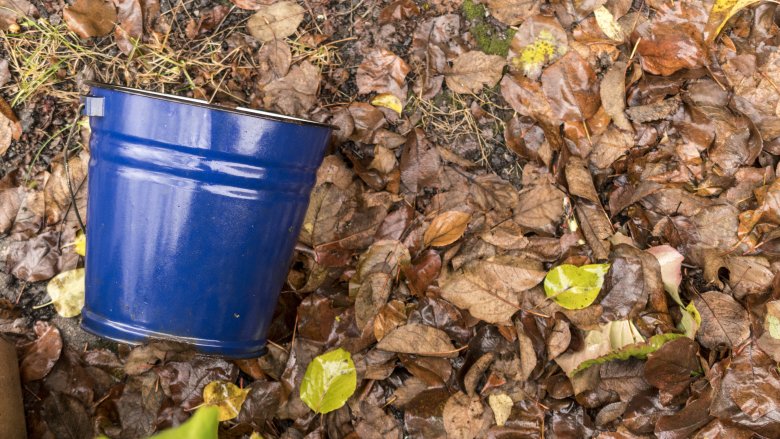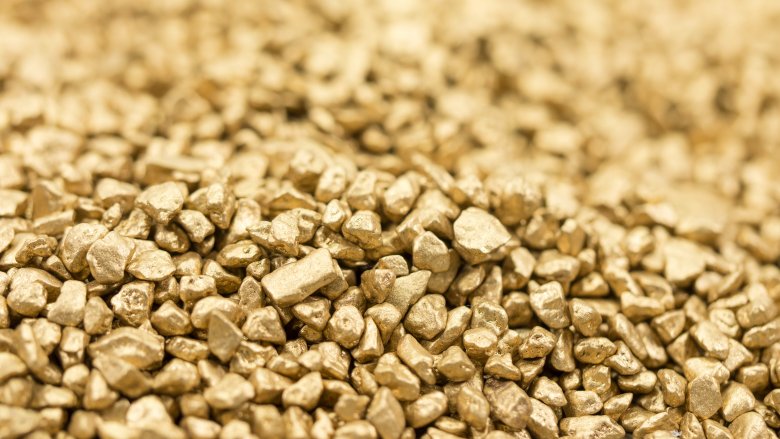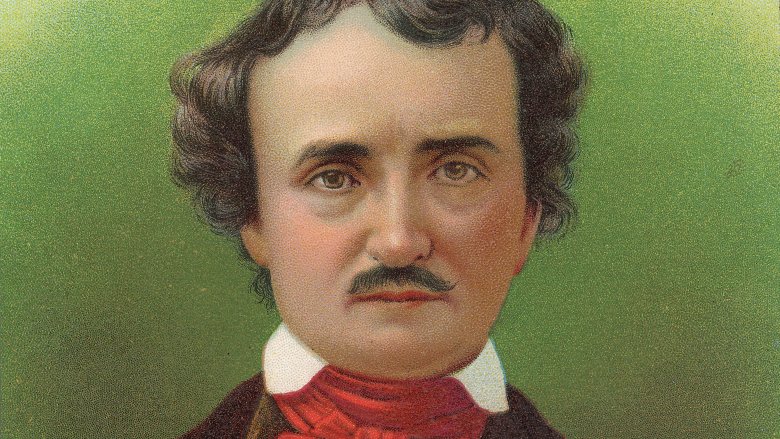Bizarre Things That Happened During The Gold Rush
The Gold Rush was a time of great romance, old-timey fun, and riches for all. Except it wasn't. We like to imagine the Gold Rush that way, but in reality there weren't a lot of millionaires made during those years. Life was a cycle of hard, thankless labor and stifling boredom, and since there was roughly one woman for every 10 men, there wasn't a whole lot of romance, either. But that doesn't mean nothing bizarre ever happened during the Gold Rush — it did, and here are some of the best stories.
Bull vs. bear fights
Here's something you probably never learned about the Gold Rush: Gold mining was super boring. Prospectors, for the most part, didn't just wander up a hill, step on a couple gold nuggets, and go home rich. They toiled for hours in the dirt and mud under a scorching hot sun and usually went home empty-handed. And this was way before HBO, so it's not like there was much to do after work, either.
Bored miners were something of a problem during the Gold Rush. Try this little experiment for a few weeks: Go outside and spend your day digging a hole. Then come home but don't turn the TV on and don't read anything. (Printed material was difficult to obtain in the mining camps and usually cost a premium.) Now imagine someone told you a bull was going to fight a bear a couple of blocks away. You'd go. Sure, you'd call the ASPCA first, but you'd totally go.
Bull vs. bear fights were like the Gold Rush's version of The Real Housewives. According to Wicked California, fight organizers would chain a bull up next to a grizzly bear, and then spectators would stand back to see what happened. Miners would bet on the outcome, and everyone would have a raucous good time watching two animals rip each other to pieces. Yay.
Miners form tiny country
No one likes to pay taxes, but miners really, really didn't like to pay taxes. Mining was backbreaking work, and taxes on top of all that work was a special kind of insult.
Shortly after California achieved statehood, the town of Rough and Ready decided it had had enough of mining taxes. It issued a manifesto, which declared that citizens were not only willing to withdraw from the United States of America, but to do so "forcibly," if necessary. And that was how Rough and Ready became "The Great Republic of Rough and Ready."
Happily, force ended up being totally unnecessary — pretty much everyone in the U.S. government who heard about the secession had a good laugh and then went on with business as usual because good luck with that. According to the Grass Valley Union, Rough and Ready was independent until the Fourth of July, three months later. Now, never mind that the Fourth of July is an American holiday and Rough and Readyans were no longer Americans — they still wanted a party because they were still bored miners and maybe they were out of bulls and bears or something. So they went down to neighboring Grass Valley to pick up some booze, and the shopkeepers said, "We don't sell liquor to foreigners." And that was that. A town meeting was called, and Rough and Ready was voted back into the Union. No manifesto shall stand between a miner and a party.
Man finds giant gold nugget while digging a grave
Modern people don't have to dig graves for their friends and loved ones, which is cool because digging a grave would totally suck. But back in the Gold Rush there weren't any funeral homes or coroners or morticians, so when someone died it was up to his friends to make sure he got a decent burial.
No one ever looked forward to digging a grave, but the unpleasant task actually resulted in good fortune for at least one miner, a man named Oliver Martin. According to the New York Times, Martin and his companion were sleeping in a cabin next to a stream when they were surprised by a flash flood. Martin survived but his companion did not — even though he'd sustained "severe injuries," he felt he owed his friend a decent burial, so he picked a spot next to an uprooted tree and started to dig. That was when he discovered "The Oliver Martin Chunk," which at the time was the largest gold nugget ever found in California. The chunk weighed 151 pounds, 6 ounces, and sold for $20,270 — or roughly $559,000 in today's dollars.
Martin, who was a bit of a heavy drinker, took the discovery as a sign from God and gave up alcohol. He later went on to earn a fortune in quartz mining, and died a millionaire — though it would not be at all surprising to hear he'd at least briefly considered a career as a grave digger.
Disposable sailing ships
There was no railroad in 1850 — at least not one capable of carrying the masses of gold-thirsty immigrants all the way across the United States. For many would-be miners, the fastest way to get to California was by ship. But ship owners had a huge problem — the ships' crews were just as easily wooed by promises of gold as their passengers were, and the crew would often walk away when they docked, leaving their ships unmanned and in limbo in the San Francisco harbor. According to The Vintage News, the problem was so pervasive that at one time there were more than 500 boats anchored in and around Yerba Buena Cove.
Owners couldn't sell their abandoned vessels either — at least not as ships — because hiring a crew was impossible and no one was looking to leave California anyway. So some ships were sold for bizarre, non-maritime purposes. They became warehouses, offices, jails, saloons, or even hotels. Sometimes they were just scrapped for building material. And sometimes they just rotted away and sank. Now logically, a seafaring job was probably worth more gold than most of those former sailors ever pulled out of the ground, but logic had no place in the Gold Rush.
Crazy inflation
During the Gold Rush, a pound of coffee would set you back around $1,200 of today's dollars. And we're not talking about a bag of Starbucks Guatemala Antigua or anything, we're talking about a bag of crappy, sucky coffee like the stuff that comes free at a Best Western, that you have to dump gallons of milk and sugar in to make drinkable, but you can't even do that because milk and sugar are also ridiculously expensive and you've already spent all your money on a bag of coffee. So in other words, don't ever complain about the prices at Starbucks.
Coffee wasn't the only thing that was ridiculously expensive during the Gold Rush — according to History, the merchants that catered to hopeful miners often made larger fortunes than the miners themselves. Lucky miners could afford, at least briefly, to pay exorbitant prices for everyday items, and enterprising shopkeepers were not at all shy about charging what they knew they could get. Here's just a sample of what you'd have to pay for food (converted to today's dollars) if you were a 49er, as reported by Smithsonian: $56 for a slice of bread (buttered), $90 for a dozen eggs, and $3,000 for a pair of boots. And if you never found another gold nugget again after blowing that first one on a bag of coffee — well, that was pretty much how things went during the Gold Rush.
The lost Blue Bucket mine
Here's a sadly common tale from the Gold Rush. Person finds gold. Person forgets where person found gold. Person dies broke. Other persons try to figure out where person found gold. Gold remains "out there somewhere" for all eternity, silently laughing at all the suckers who wasted their lives trying to find it.
Here's one such tale: According to Offbeat Oregon, a wagon train got lost somewhere in the high desert of Oregon, but passengers were lucky enough to find a stream where they could set up camp. The kids who were traveling on the wagon train, eager for something to do besides dying of dysentery, which is what people did on the Oregon Trail, went down to the stream to play. The kids noticed the stream was full of heavy yellow pebbles — so many they could just shovel them out. They filled up a blue bucket with the pebbles and brought them back to camp, and the adults were all, "Cool, those heavy pebbles will make great sinkers, let's go fishing." And then the next day they moved on, leaving all the yellow pebbles behind because there was no sense in making the oxen pull more weight than necessary.
Then four years later John Marshall found gold in California, and the adults who had been traveling on that particular wagon train said a loud "Oh shoot!" And despite lots of attempts, no one has ever been able to find the lost Blue Bucket mine.
'Salted' mines
Empty mines were a problem for 49ers, because you can't mine an empty mine, and you can't sell it, either. So what's an honest prospector to do? Defraud someone else into buying it.
In what was sort of like the eBay of the old West, miners would "fix up" their unwanted claims — a practice roughly equivalent to photographing your expensive vase from an angle that fails to reveal the enormous crack, and then claiming afterward that the crack happened during shipping.
In a practice known as "salting," prospectors would scatter gold around the inside of a mine to convince buyers there was still something to be found inside, and for some reason it didn't always occur to the buyers that no one was going to part with a mine that still had something to be found inside. According to Sierra County Gold, sellers could be pretty devious — one removed 6 feet of soil, mixed it with gold, reburied it, and covered it with debris. The buyers, believing that the corner with the debris was probably the most untouched, were fooled into thinking the mine was a windfall.
It turns out there was such a thing as karma even during the Gold Rush — sometimes sellers swindled people into buying mines that turned out to be profitable. That happened to some Chinese miners when the "empty" mine sold to them by American prospectors turned out to be one of the most profitable in the area. The Americans just didn't dig deep enough.
Valuable silver ore was discarded
Gold was the one and only reason most would-be miners came to the west during the Gold Rush. After all, it wasn't called "The Gold and Occasionally Other Precious Metals Rush," so you can't really blame miners for not looking beyond that dull yellow sparkle.
In June 1859, miners working Gold Canyon in Nevada were finding quite a bit of gold mixed in with a blue-gray mud. The mud stuck to everything, clogged up the equipment, and was so pervasive that it became known as "that damned blue stuff." Miners went a bit nuts trying to separate the gold from the blue mud, and some of them even gave up and went off in search of cleaner diggins. Then in June of that year, it occurred to someone that maybe the blue stuff ought to be analyzed. An assayer had a look at the rock that miners were pulling out of the area and determined that 1 ton of it would yield around $876 in gold and $3,000 in silver. The "damned blue stuff" that miners had been throwing out in great annoyance was not just silver, it was super-concentrated silver — what many historians consider to be the "greatest single mineral strike in history." And that's how the facepalm was invented.
Edgar Allan Poe's hoax
For some reason, Edgar Allan Poe did not like people going west in search of gold. Historians really have no idea what his problem was, but it probably had something to do with all the melancholy. Anyway, one day he was all "I don't like this Gold Rush business, I'm going to play a grand joke on everyone." So he wrote an article for The Flag of Our Union entitled "Von Kempelen and His Discovery." In the article, Poe claimed that a German scientist had discovered the long sought-after secrets of alchemy, specifically, how to turn lead into gold. In other words, now that it could be done in a lab all those miners might as well come home because prospecting was totally pointless.
Poe was so smug about his little joke that he wrote a smug letter to fellow author Evert A. Duyckinck, smugly declaring that "nine persons out of ten (even among the best informed) will believe ... and that thus, acting as a sudden, although of course a very temporary, check on the gold fever, it will create a stir to some purpose."
Sadly, or perhaps happily depending on how obnoxious you find this story, no one believed the hoax, the miners just went on prospecting anyway, and Edgar Allan Poe was annoyed. Perhaps he was just jealous that no one had ever come gently rapping, rapping at his chamber door with the deed to a prosperous gold mine in California.
Miners rolling naked down hills
Between 1849 and 1852, 1 percent of the American population left their homes and families in the hope of finding gold in California. Most of them were disappointed. Now imagine the 2,779.9-mile walk of shame back to New York City, where you'd have to tell your family that despite your $3,000 (equivalent) pair of boots you not only failed to strike it rich, but you still owe some guy the equivalent of $2,995 for your pair of boots. It's not shocking that unlucky miners started to get desperate, and desperate people will buy just about anything, like weight loss pills and homeopathic remedies for colicky babies.
Case in point: Gold Grease, which cost around $200 in today's money. This product not only promised something it absolutely failed to deliver, but did it in the most humiliating way possible. Here's how Gold Grease was used: Miner strips naked. Miner smears Gold Grease all over himself. Miner rolls down hill. Miner gets to the bottom and looks like C3PO because of all the gold dust stuck on to the Gold Grease.
It will certainly not surprise you to hear that Gold Grease was a spectacular ripoff that succeeded in making exactly one person rich: guy who invented it. Somehow, he wasn't ridden out of town by his first couple marks.
The shootout at Gold Flat
The Wild West was definitely a land without (much) law. And it was frightening enough if you were just an ordinary pioneer trying to eke out a living on a little farm somewhere out West. Now imagine if you were a miner, and even scarier, if you were a miner with a few gold nuggets in his pocket. Life would be a terrifying pattern of sleepless nights followed by days of filthy, sweaty work, with a few bull and bear fights thrown in when you got bored.
For the luckier prospectors, the idea of a bandit running around loose was about the most terrifying thing ever, and when Jim Webster escaped from the Nevada City jail, town residents feared the worst.
According to Nevada County Gold, not long after the jailbreak, residents reported seeing two unattended horses at the nearby mining camp of Gold Flat. Evidently unattended horses were sort of like unattended baggage at the airport, so everyone freaked out a little and sent some guys up to the camp to check it out. The men hid nearby and got so worked up while waiting that they were pretty dang ready to kill something by the time the horses' owners finally appeared. Shots were exchanged, and when the smoke cleared the town deputy and sheriff were dead — as it turned out, Jim Webster was long gone and the townspeople had been lying in wait for their own lawmen.
Woman finds gold while playing fetch with her dog
It wasn't all the (many) stories of misfortune that kept gold-thirsty prospectors coming to California, it was the stories of freakishly lucky finds that made people rich with almost no effort. Stories like this one.
According to the New York Times, a young woman in Alpine County was throwing rocks for a dog — as a footnote, let's just clarify that she was not throwing rocks at a dog, but for a dog, which kind of seems like a mean thing to do to your dog's teeth when there are plenty of perfectly good sticks lying around in the state of California. But anyway, one of the rocks she picked up had a heavy weight to it and was a dull yellow color — she'd struck gold, in fact she'd found a monster nugget that eventually sold for today's equivalent of $46,280 ... enough to buy 14 pairs of boots and three pounds of coffee, with some change left over for a few dozen eggs and a slice of buttered toast.
The lucky woman and her husband returned to the spot where she'd found the nugget but did not get lucky again, which was pretty much the same story for just about everyone who found gold except for the lucky few who were in the right place at the right time, and did not get robbed, swindled, or covered with Gold Grease in the process. The Gold Rush was certainly an interesting time, but romantic? We're going to say "no."
